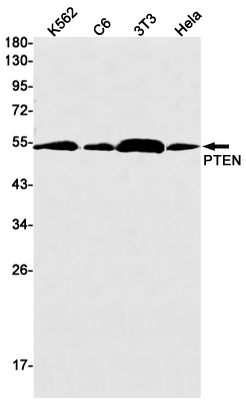
| WB | 1/500-1/1000 | Human,Mouse,Rat |
| IF | 咨询技术 | Human,Mouse,Rat |
| IHC | 咨询技术 | Human,Mouse,Rat |
| ICC | 技术咨询 | Human,Mouse,Rat |
| FCM | 咨询技术 | Human,Mouse,Rat |
| Elisa | 咨询技术 | Human,Mouse,Rat |
| Aliases | PTEN; MMAC1; TEP1; Phosphatidylinositol 3; 4; 5-trisphosphate 3-phosphatase and dual-specificity protein phosphatase PTEN; Mutated in multiple advanced cancers 1; Phosphatase and tensin homolog |
| Entrez GeneID | 5728 |
| WB Predicted band size | Calculated MW: 47 kDa; Observed MW: 54 kDa |
| Host/Isotype | Rabbit IgG |
| Antibody Type | Primary antibody |
| Storage | Store at 4°C short term. Aliquot and store at -20°C long term. Avoid freeze/thaw cycles. |
| Species Reactivity | Human,Mouse,Rat |
| Immunogen | A synthetic peptide of human PTEN |
| Formulation | Purified antibody in TBS with 0.05% sodium azide,0.05%BSA and 50% glycerol. |
+ +
以下是关于PTEN抗体的3篇代表性文献及其摘要概括:
---
1. **文献名称**: *"PTEN antibody specificity and localization in human cancer"*
**作者**: Bose S, et al.
**摘要**: 该研究评估了多种市售PTEN抗体在免疫组化(IHC)和Western blot中的特异性,发现部分抗体存在非特异性结合问题。通过比较不同抗体在PTEN缺失型肿瘤中的表现,提出了优化实验条件(如抗原修复方法)的建议,以提高检测准确性。
---
2. **文献名称**: *"Subcellular localization of PTEN is regulated by its C-terminal region in a antibody-dependent manner"*
**作者**: Liang H, et al.
**摘要**: 研究利用特异性识别PTEN C末端的抗体,揭示了PTEN在细胞核与细胞质间的动态分布机制。实验表明,某些抗体能特异性检测核内PTEN,而另一些仅识别胞质形式,提示抗体选择对亚细胞定位研究至关重要。
---
3. **文献名称**: *"Comparative analysis of PTEN immunohistochemistry in glioblastoma: Impact of antibody clones and staining protocols"*
**作者**: Nakamura N, et al.
**摘要**: 比较了三种常用PTEN抗体克隆(如D4.3和6H2.1)在胶质母细胞瘤中的染色效果,发现不同克隆对福尔马林固定组织的敏感性差异显著。研究强调抗体验证需结合临床样本,以避免假阴性结果。
---
这些文献覆盖了抗体验证、亚细胞定位及临床应用中的关键问题,可为PTEN相关实验的抗体选择提供参考。如需具体期刊信息或发表年份,可进一步补充检索关键词(如“克隆号”或“癌症类型”)缩小范围。
**Background of PTEN Antibodies**
PTEN (phosphatase and tensin homolog deleted on chromosome 10) is a tumor suppressor protein encoded by the *PTEN* gene, which plays a critical role in regulating cell growth, survival, and metabolism. It functions primarily as a lipid phosphatase, antagonizing the PI3K/AKT/mTOR signaling pathway by dephosphorylating phosphatidylinositol (3.4.5)-trisphosphate (PIP3), thereby inhibiting oncogenic signaling and promoting genomic stability. Loss-of-function mutations or epigenetic silencing of PTEN are linked to various cancers, neurodegenerative disorders, and metabolic syndromes.
PTEN antibodies are essential tools in biomedical research and diagnostics, enabling the detection and quantification of PTEN expression and post-translational modifications (e.g., phosphorylation, ubiquitination) in tissues or cell lines. These antibodies are widely used in techniques such as Western blotting, immunohistochemistry (IHC), immunofluorescence (IF), and flow cytometry. Specific PTEN antibodies can distinguish between full-length PTEN and its isoforms or cleavage products, providing insights into its regulatory mechanisms.
Given PTEN's clinical relevance, antibodies must be rigorously validated for specificity and sensitivity, as false signals may arise due to homologous proteins or degraded samples. Researchers often use PTEN-null controls or knockout validation to confirm antibody reliability. Commercially available PTEN antibodies vary in clonal origin (monoclonal vs. polyclonal), species reactivity, and application compatibility, necessitating careful selection based on experimental requirements. Their utility extends to studying PTEN's role in cancer progression, therapeutic resistance, and as a biomarker for patient stratification.
×